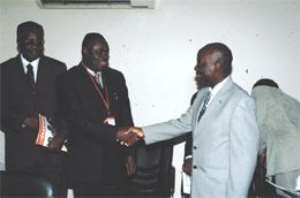
The Director of the Noguchi Memorial Institute for Medical Research, Professor Alex Nyarko, has called for a well co-ordinated research into the effectiveness and safety of plant medicine.
He said although a lot of research was being done on the effectiveness of plant medicine, the activities were unco-ordinated.
That, he said, did not help the development of plant medicine in the country and its use by patrons.
Prof. Nyarko made the call when the leadership of the College of Health Sciences paid a courtesy call on the Managing Director of the Graphic Communications Group Limited (GCGL), Mr Ibrahim Awal, in Accra on Wednesday.
He explained that most of the research being done into the effectiveness of plant medicine dealt mostly with aspects of the medicines.
He said one could find one research institution dealing with the efficacy of a plant in treating a particular ailment and did not cover its effects or how it could be combined with other medication.
Prof. Nyarko conceded that every drug had its side effects but health practitioners often considered the risk to benefit ratio before prescribing any drug to patients.
He expressed concern about the alarming rate at which Ghanaians patronised plant medicines especially those which related to sexual virility.
Prof. Nyarko appealed to members of the public to guard against the abuse of such herbal concortions, since they could have serious effects on them later.
The Provost of the College of Health Sciences, Professor Aaron Lawson, who led the delegation, noted for instance that when the World Health Organisation (WHO) accepted Artesunate Amodaquine as the treatment for malaria, local manufacturers instead of breaking the medication into dosages, decided to put it in one dose.
That, he said, resulted in the problems that many patients experienced with its initial intake.
He said the College of Health Sciences would hold its first College-wide Annual Scientific Conference next month.
The conference, which would come off from September 26 to 28, 2007, on the theme “Advancing the health of Ghanaians through research and capacity building”, will seek to disseminate findings of research to help Ghanaians improve upon their health status.
Until the decision to hold the first-ever college-wide conference, the various schools under the college had been organising their respective scientific conferences.
Prof. Lawson said the college considered the GCGL as a strategic partner in disseminating information to the public.
He said the college would, therefore, use the GCGL to disseminate the findings to be made at the conference to the public so that the ordinary man in the street could benefit from the findings of the research.
The Managing Director of GCGL, Mr Ibrahim Awal, pledged GCGL's support for the college by devoting some of its pages for the publication of findings to ensure that the college's activities benefited the larger society.
That, according to him, would contribute to preventive health as the findings would make the public take their health seriously and be cautious in their lifestyles.
Mr Awal stated that the GCGL did not only believe in informing and educating the public but setting the agenda for national development through such activities.
Story by Albert K. Salia




 Burkina Faso expels French diplomats for 'subversive activities'
Burkina Faso expels French diplomats for 'subversive activities'
 GOIL reduces petrol price by 29 pesewas, sells GHC14.70 per litre
GOIL reduces petrol price by 29 pesewas, sells GHC14.70 per litre
 The disrespect towards security is terrible; we can do better — Atik Mohammed co...
The disrespect towards security is terrible; we can do better — Atik Mohammed co...
 Starlink to cease connection in Ghana, other “unavailable” countries on April 30...
Starlink to cease connection in Ghana, other “unavailable” countries on April 30...
 MMCEs, DCEs and Regional Ministers must be elected to reduce political interfere...
MMCEs, DCEs and Regional Ministers must be elected to reduce political interfere...
 National Cathedral: ‘Nonsense; you take taxes from broke Ghanaians to dig a clum...
National Cathedral: ‘Nonsense; you take taxes from broke Ghanaians to dig a clum...
 April 18: Cedi sells at GHS13.59 to $1, GHS13.01 on BoG interbank
April 18: Cedi sells at GHS13.59 to $1, GHS13.01 on BoG interbank
 We must harness the collective power and ingenuity of female leaders to propel o...
We must harness the collective power and ingenuity of female leaders to propel o...
 Saglemi Housing Project will not be left to rot – Kojo Oppong Nkrumah
Saglemi Housing Project will not be left to rot – Kojo Oppong Nkrumah
 Asantehene commends Matthew Opoku Prempeh for conceiving GENSER Kumasi Pipeline ...
Asantehene commends Matthew Opoku Prempeh for conceiving GENSER Kumasi Pipeline ...
